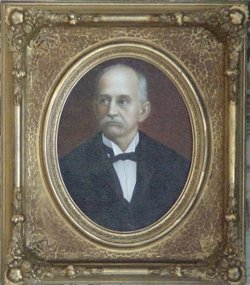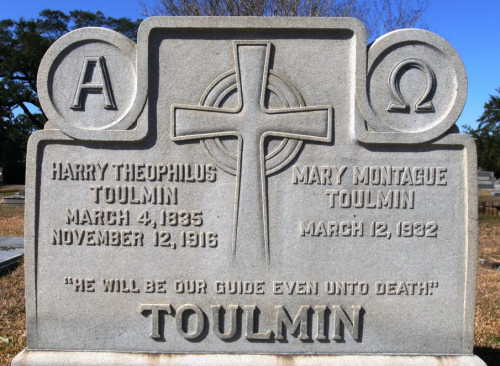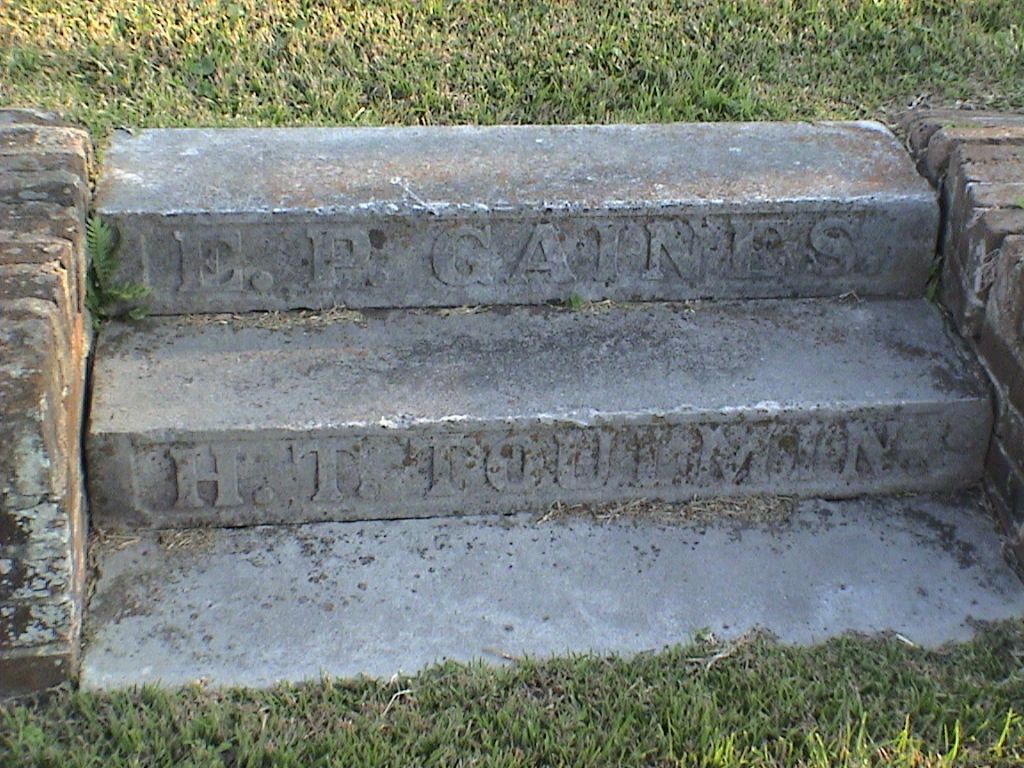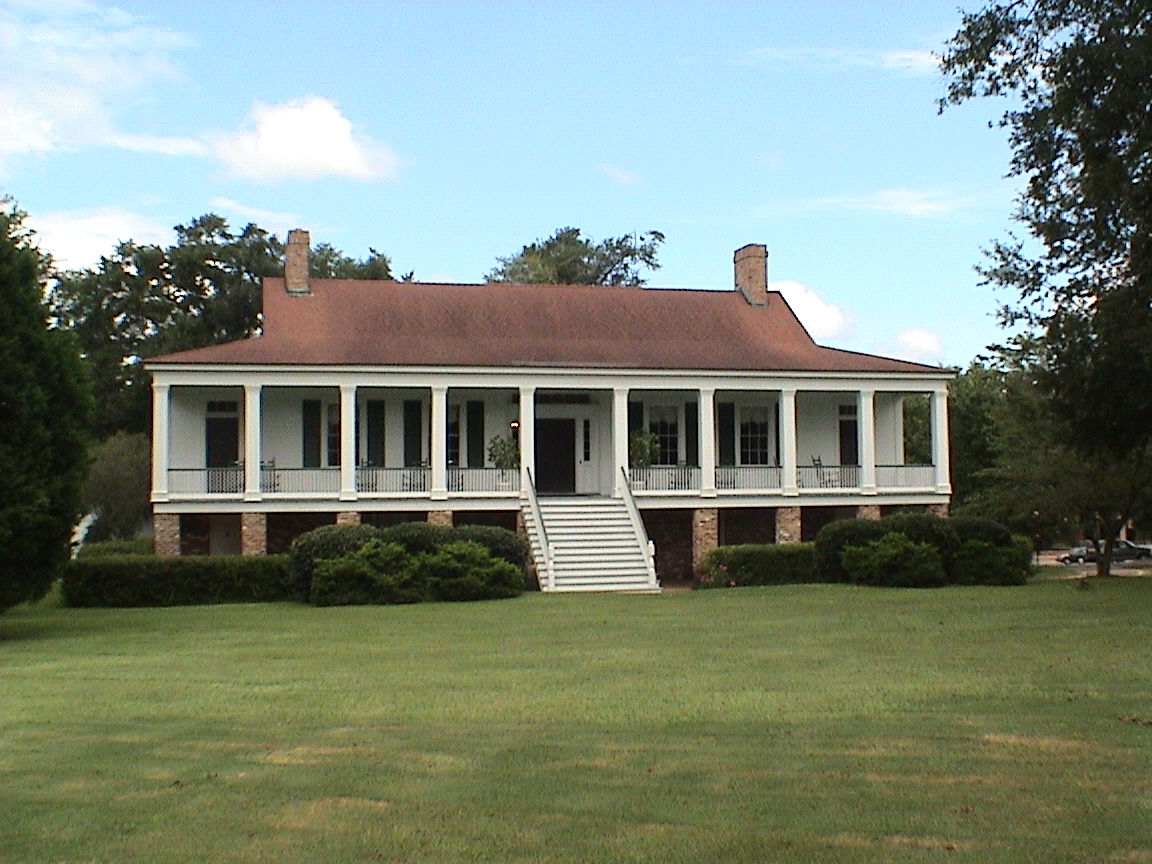He was appointed Postmaster of Mobile in 1848 by President James K. Polk. He was reappointed by Presidents Franklin Pierce and James Buchanan. He served in this office until he voluntarily relinquished it in 1859.
The General and his wife were originally interred in the family cemetery in Toulminville, Alabama but were removed to The Old Springhill Graveyard. The Toulmin home, in which H.T. was raised, was moved to the campus of The University of South Alabama, where it was restored. Toulminville, Alabama is named in honor of General Toulmin.
Harry T. Toulmin married Mary ( Mollie ) Montague Henshaw on May 4, 1869 at Trinity Episcopal Church. She was 19 years old. Mollie was the niece of The Honorable David Henshaw. David Henshaw was appointed Secretary of The Navy by President John Tyler. She was born on her family plantation "Willow Banks" in Cumberland County, Virginia, and raised in Claiborne, Alabama. Harry and Mollie had no children.
Harry Toulmin was educated at the University of Alabama. He also attended classes for one year at The University of Virginia and then took a course in legal lectures at The University of Louisiana. He worked very closely under the direction of the Honorable Robert H. Smith, a prominent Mobile Attorney, who served in The Alabama State Legislature, the Confederate Provisional Congress and was a signer of the Confederate Constitution. He too served as a Colonel in the Confederate Provisional Army. Harry immediately passed his bar exam and in July of 1860 formed a partnership with his former tutor. He became a Senior Warden at Trinity Episcopal Church in downtown Mobile.
Just as Harry Toulmin's practice began to flourish, Alabama seceded from the United States. On April 23rd, 1861, Harry took leave from his law practice and enlisted as a private in the 22nd Alabama Infantry. His first promotion came in September of that same year when he was advanced to the rank of Lieutenant of Company H. Shortly thereafter he was promoted to Captain of that same unit.
He participated in The Battle of Shiloh, where he was wounded, he subsequently fought in the battles of Murfreesboro, Perryville, Missionary Ridge and Chickamauga. He was promoted to Major after the Battle of Chickamauga. Shortly thereafter he obtained the rank of Lt. Colonel and then in July of 1864 he was promoted to full colonel. He served as Colonel throughout the Atlanta campaign, the Battles of Franklin and Nashville and up until surrender with General Johnston at Greensboro N.C. on April 26th, 1865.
Upon the end of the American Civil War, Harry Toulmin returned to his law practice in Mobile, Alabama. He quickly rose in prominence and ranking among attorneys in the southwest Alabama area. He entered the political arena in 1868 when he was chosen as a Democratic Presidential Elector and became a member of the Alabama State House of Representatives 1870-1872; Circuit Judge in Alabama 1870-1872 U.S. He was a trustee of The Alabama Medical College and on the board of the YMCA. In November of 1874 he was appointed Federal District Judge for the Southern District of Alabama, 1887-1916. He died in office at the age of 78.
OBITUARY: New York Times
Mobile, Al., November, 12, 1916
Harry Theophilus Toulmin, Federal Judge for the Southern District of Alabama, died tonight in his home in Toulminville, Alabama in his seventy ninth year. He suffered a stroke of Paralysis on Friday. Judge Toulmin, who had served for 30 years on the Federal Bench, had already notified President Cleveland of his intention to retire on Dec. 1, but his resignation had not been accepted.
____________________________________
" He was not deficient in a single quality that should belong to a jurist, and each of these qualities was developed to a degree rarely attained."
He was appointed Postmaster of Mobile in 1848 by President James K. Polk. He was reappointed by Presidents Franklin Pierce and James Buchanan. He served in this office until he voluntarily relinquished it in 1859.
The General and his wife were originally interred in the family cemetery in Toulminville, Alabama but were removed to The Old Springhill Graveyard. The Toulmin home, in which H.T. was raised, was moved to the campus of The University of South Alabama, where it was restored. Toulminville, Alabama is named in honor of General Toulmin.
Harry T. Toulmin married Mary ( Mollie ) Montague Henshaw on May 4, 1869 at Trinity Episcopal Church. She was 19 years old. Mollie was the niece of The Honorable David Henshaw. David Henshaw was appointed Secretary of The Navy by President John Tyler. She was born on her family plantation "Willow Banks" in Cumberland County, Virginia, and raised in Claiborne, Alabama. Harry and Mollie had no children.
Harry Toulmin was educated at the University of Alabama. He also attended classes for one year at The University of Virginia and then took a course in legal lectures at The University of Louisiana. He worked very closely under the direction of the Honorable Robert H. Smith, a prominent Mobile Attorney, who served in The Alabama State Legislature, the Confederate Provisional Congress and was a signer of the Confederate Constitution. He too served as a Colonel in the Confederate Provisional Army. Harry immediately passed his bar exam and in July of 1860 formed a partnership with his former tutor. He became a Senior Warden at Trinity Episcopal Church in downtown Mobile.
Just as Harry Toulmin's practice began to flourish, Alabama seceded from the United States. On April 23rd, 1861, Harry took leave from his law practice and enlisted as a private in the 22nd Alabama Infantry. His first promotion came in September of that same year when he was advanced to the rank of Lieutenant of Company H. Shortly thereafter he was promoted to Captain of that same unit.
He participated in The Battle of Shiloh, where he was wounded, he subsequently fought in the battles of Murfreesboro, Perryville, Missionary Ridge and Chickamauga. He was promoted to Major after the Battle of Chickamauga. Shortly thereafter he obtained the rank of Lt. Colonel and then in July of 1864 he was promoted to full colonel. He served as Colonel throughout the Atlanta campaign, the Battles of Franklin and Nashville and up until surrender with General Johnston at Greensboro N.C. on April 26th, 1865.
Upon the end of the American Civil War, Harry Toulmin returned to his law practice in Mobile, Alabama. He quickly rose in prominence and ranking among attorneys in the southwest Alabama area. He entered the political arena in 1868 when he was chosen as a Democratic Presidential Elector and became a member of the Alabama State House of Representatives 1870-1872; Circuit Judge in Alabama 1870-1872 U.S. He was a trustee of The Alabama Medical College and on the board of the YMCA. In November of 1874 he was appointed Federal District Judge for the Southern District of Alabama, 1887-1916. He died in office at the age of 78.
OBITUARY: New York Times
Mobile, Al., November, 12, 1916
Harry Theophilus Toulmin, Federal Judge for the Southern District of Alabama, died tonight in his home in Toulminville, Alabama in his seventy ninth year. He suffered a stroke of Paralysis on Friday. Judge Toulmin, who had served for 30 years on the Federal Bench, had already notified President Cleveland of his intention to retire on Dec. 1, but his resignation had not been accepted.
____________________________________
" He was not deficient in a single quality that should belong to a jurist, and each of these qualities was developed to a degree rarely attained."
Inscription
"He Will Be Our Guide, Even Unto Death"
Family Members
Sponsored by Ancestry
Advertisement
Explore more
Sponsored by Ancestry
Advertisement















